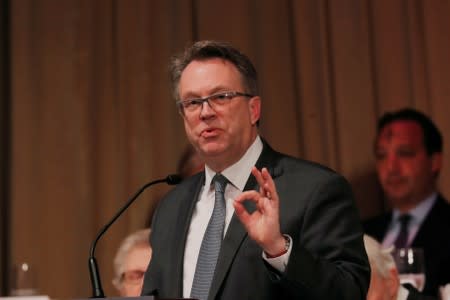Fed's Williams says case for a U.S. rate cut is stronger

By Trevor Hunnicutt
ALBANY, N.Y. (Reuters) - The case for cutting rates has grown stronger because of uncertainties weighing on the U.S. economy and weaker inflation, New York Federal Reserve President John Williams said on Thursday.
"If anything, relative to earlier in the year, the conditions, the arguments, for adding policy accommodation have strengthened over time," Williams told reporters on the sidelines of an event at the University at Albany - State University of New York.
"We've got the uncertainties, especially related to trade and global growth. We have issues around inflation expectations being soft, and obviously inflation data continuing to run below 2%."
A single strong jobs report and a commitment by Washington and Beijing to return to active trade negotiations did not remove the issues that the Fed found concerning at its last meeting, Williams said, echoing comments by Chairman Jerome Powell in his congressional testimony this week.
At its June 18-19 meeting, many policymakers expressed the view that stimulus would be needed soon, according to the minutes from that meeting released on Wednesday.
But some policymakers have also cautioned that the case is not yet strong enough to cut rates at their next meeting on July 30-31, a move markets regard as a near certainty.
Williams said the economy is still in a good place and set to grow above its long-run potential this year with no recession in sight. He told reporters that markets' expectations are already supporting lower interest rates on corporate bonds and mortgages, stimulating economic activity.
Yet he highlighted worrisome trends, including "that manufacturing production is in decline," global growth and domestic job gains are slowing, and inflation below the central bank's target may be negatively affecting people's decisions when they spend and set prices.
"The headline data mask a more nuanced economic picture," Williams said of the longest U.S. economic expansion on record. The New York-based central banker has a vote on the committee that sets rates.
The Fed has kept its current benchmark overnight interest rate in a range of between 2.25% and 2.50% since December.
"Monetary policy is an important tool, but it alone cannot address all the economic issues that we face," Williams told students here.
Williams' remarks represent a sharp shift from his assessment in May, when he was asked whether a rate cut was needed to support inflation. At that time, he said, "I don't think we're at that point today, and I don't think we'll be at that point in the very near future."
(Reporting by Trevor Hunnicutt in Albany, N.Y.; editing by Chizu Nomiyama)